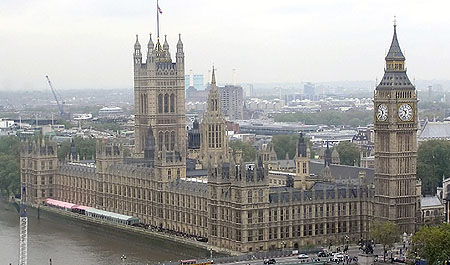HIS 102
Unit 2: Seventeenth-Century Europe

Westminster
Palace
in London. The Palace is where the two houses of the Parliament
of the United Kingdom (House of Lords and House of Commons) meet.
The building originally housed the English monarchs and dates to the
Middle Ages, but it has been rebuilt and expanded many times over the
centuries. One of the Palace's most famous features is the clock
tower to the right (where the famous bell Big Ben is located).
The other main tower is the Victoria tower. It was Parliament
which carried out the "Glorious Revolution" in 1688, removing King
James II from the throne of England. Photo courtesy Wikipedia Commons.
 What you must do in this unit
What you can do in this unit
Some videos that you can watch for this unit
Extra Credit Options
What you must do in this unit
What you can do in this unit
Some videos that you can watch for this unit
Extra Credit Options
- Take the short 5-point quizzes for this unit's textbook chapters. Log into Blackboard and look under "Chapter Quizzes." You have five minutes to complete each quiz (multiple-choice questions).
- For 50 points maximum extra credit, write a one-page paper, What was
Louis XIV's conception of absolutism? Please be sure to cite your
sources.
- For 50 points maximum extra credit, compare and contrast the reigns of
Louis XIV and Peter the Great in a one-page paper. Please be sure to cite your
sources.
- For 25 points maximum extra credit, read the English Bill of Rights and write a paragraph in which you examine, Was the English Bill of Rights a
democratic document? Note the earlier important political
document in England was the Petition of Right (1628).
- For a possible 25 points extra credit, read the short excerpt (*.pdf file) from Utopia (1516) by Sir Thomas More (1478-1535) and comment about its relevance over the succeeding centuries.
- For 10 points maximum extra credit, answer the English Bill of Rights study sheet questions.
- For extra credit, please suggest a
relevant website for this unit of the course. Send the title of the site, the url and a
brief explanation why you find the information interesting and applicable to
the material being studied this unit.
|

